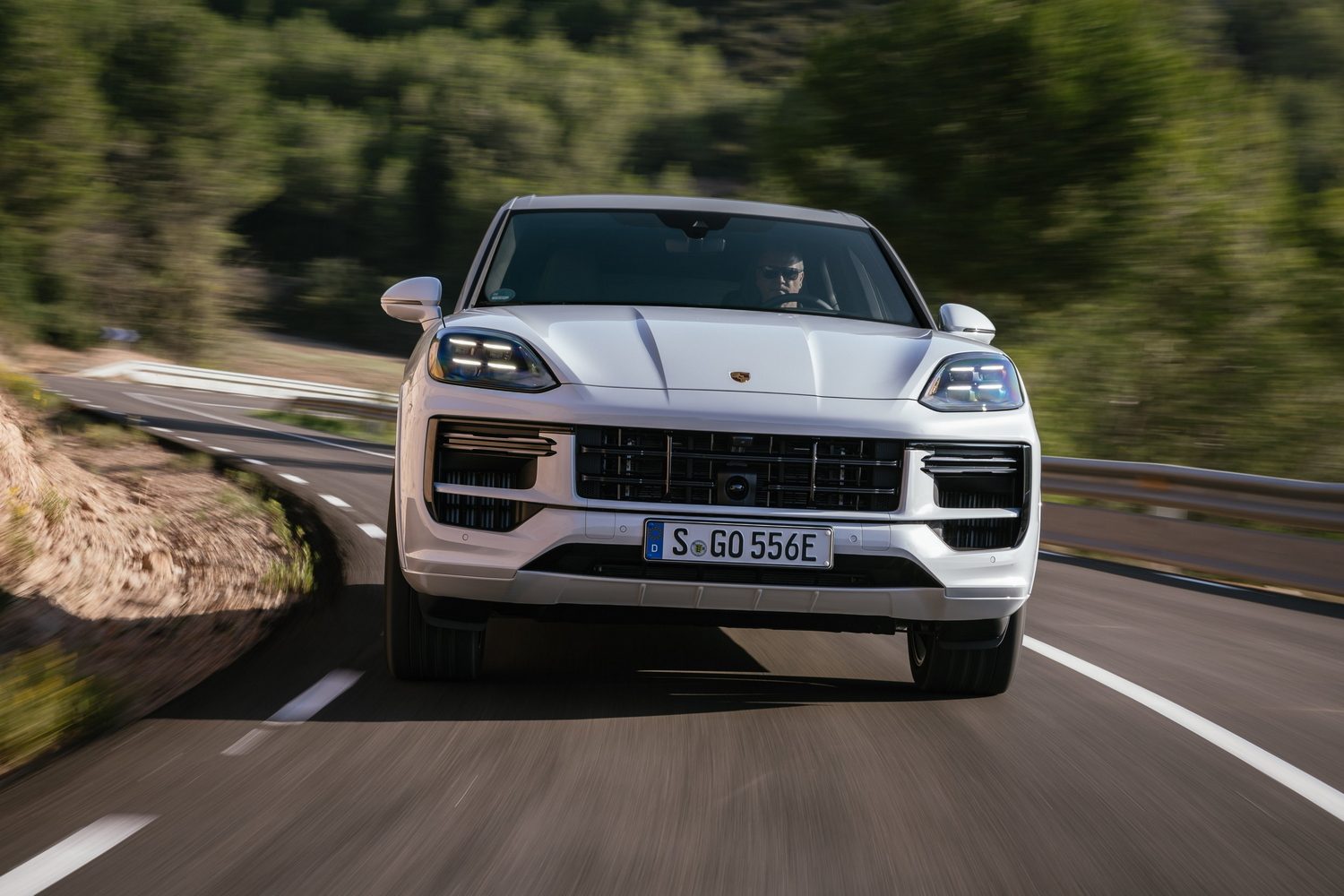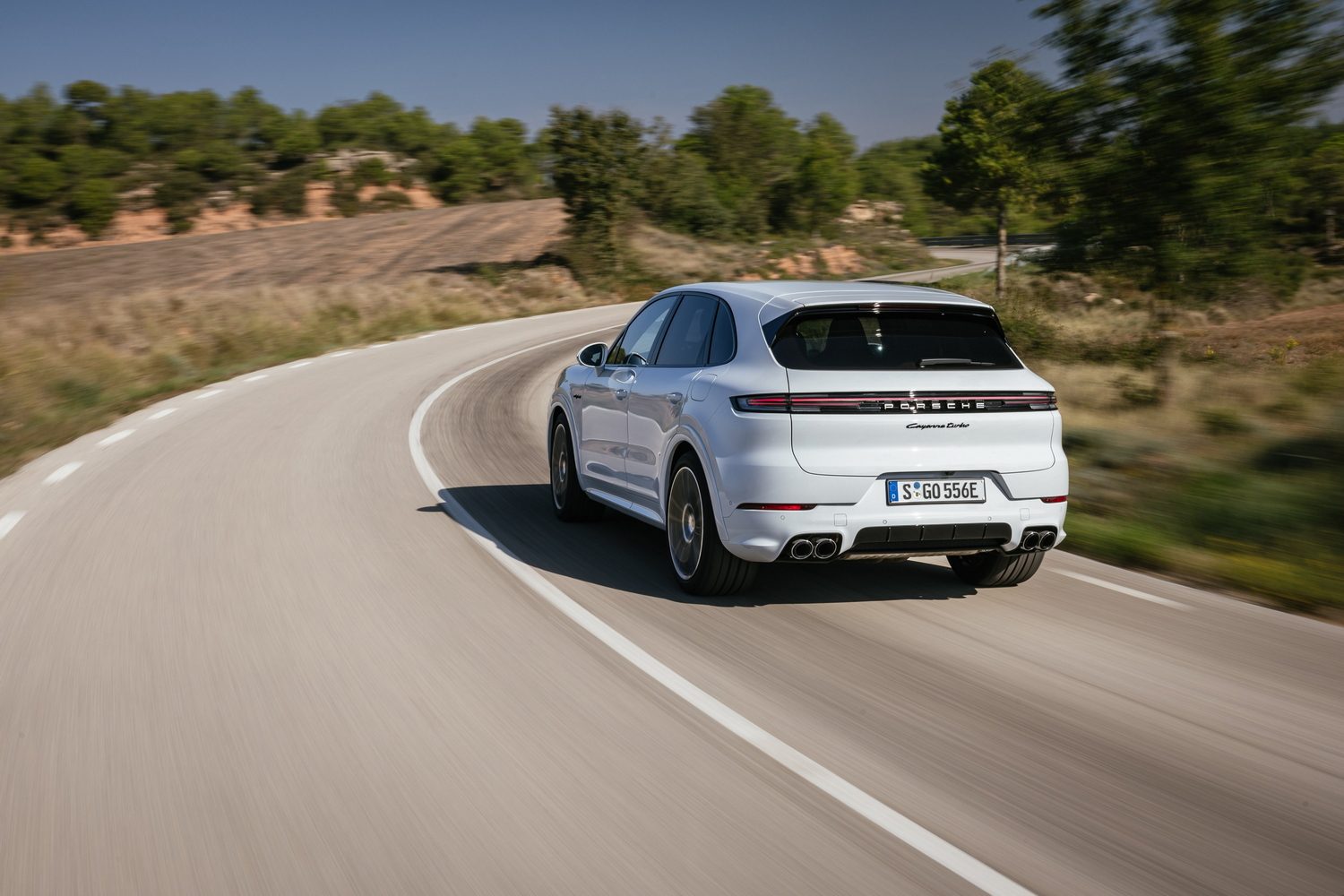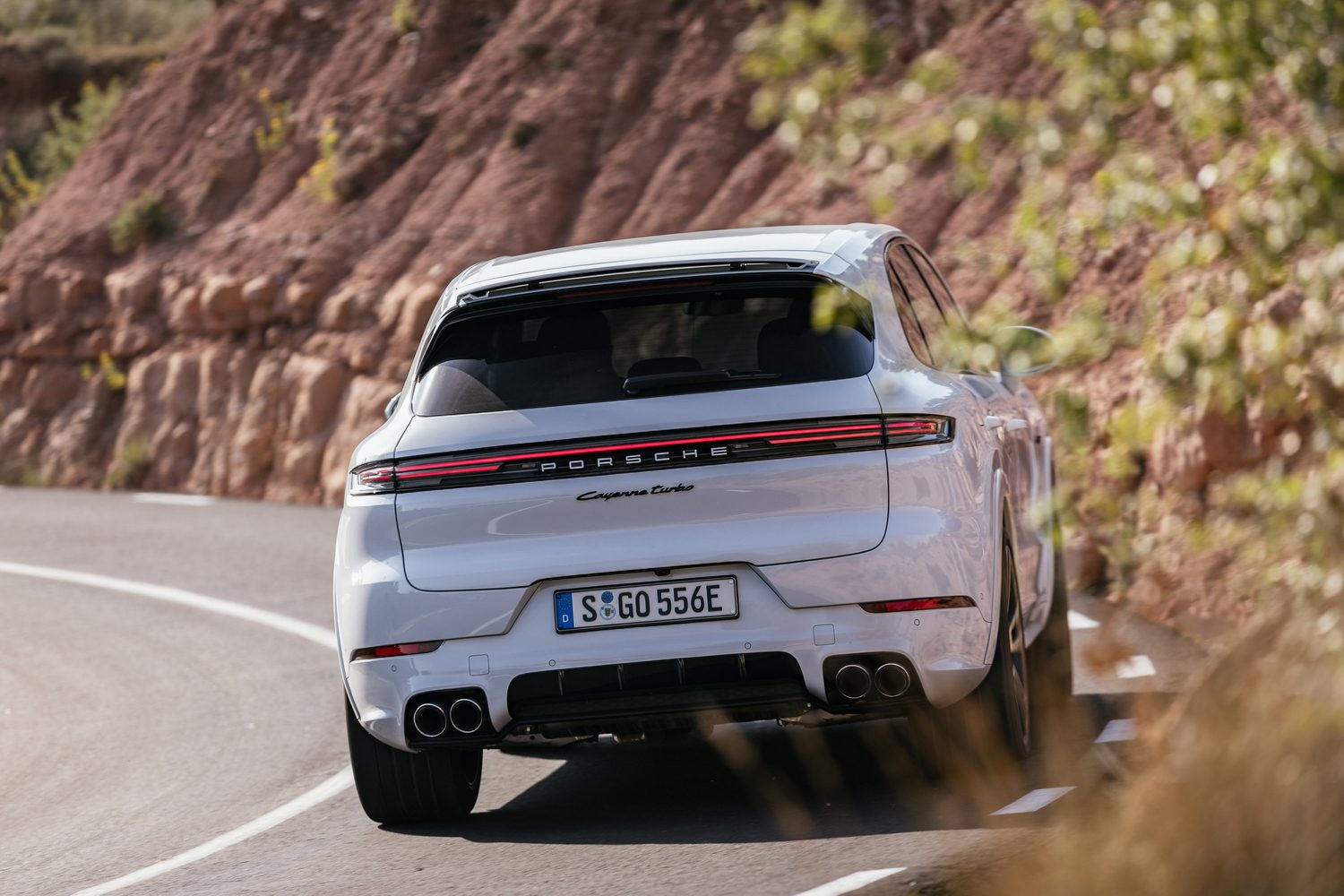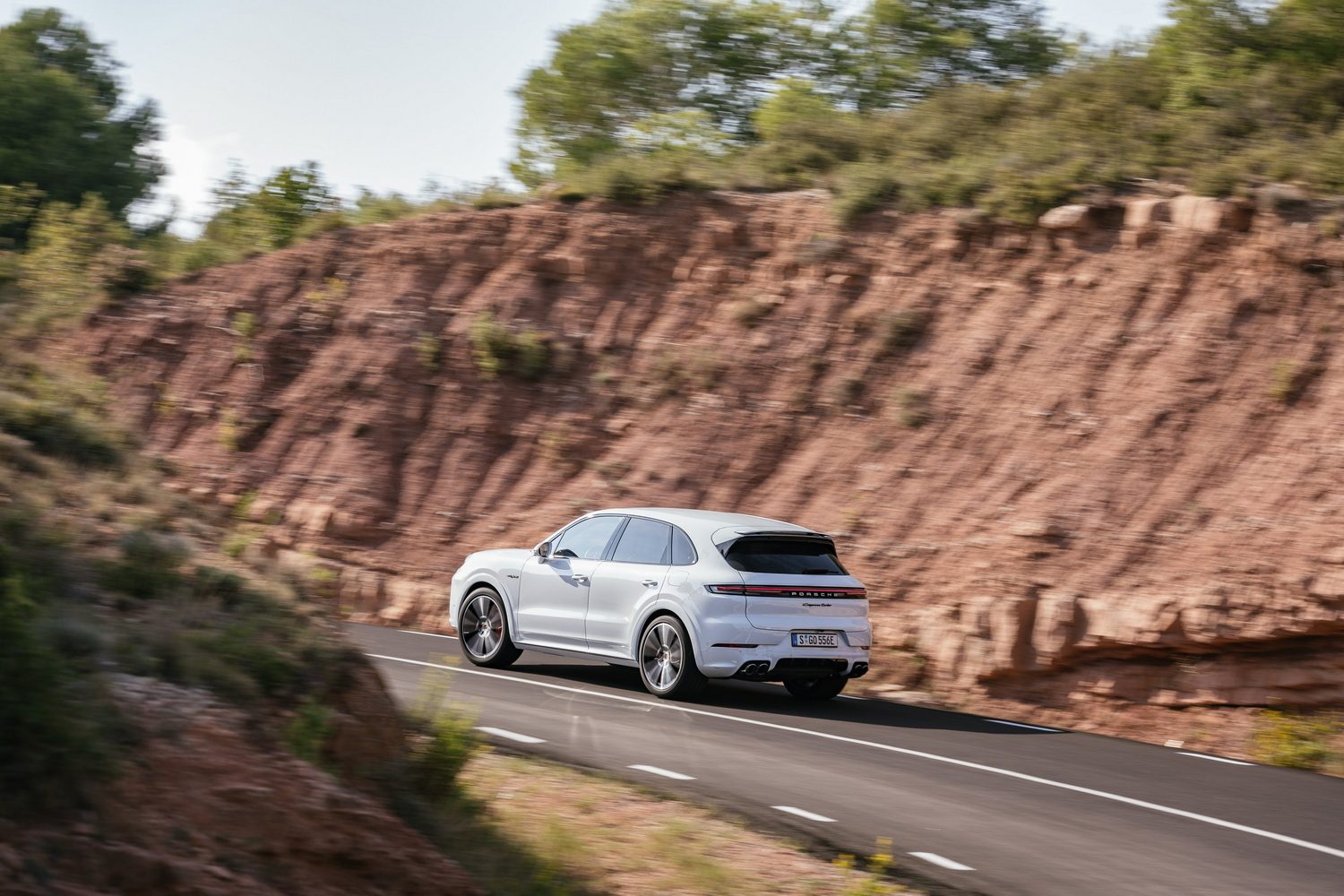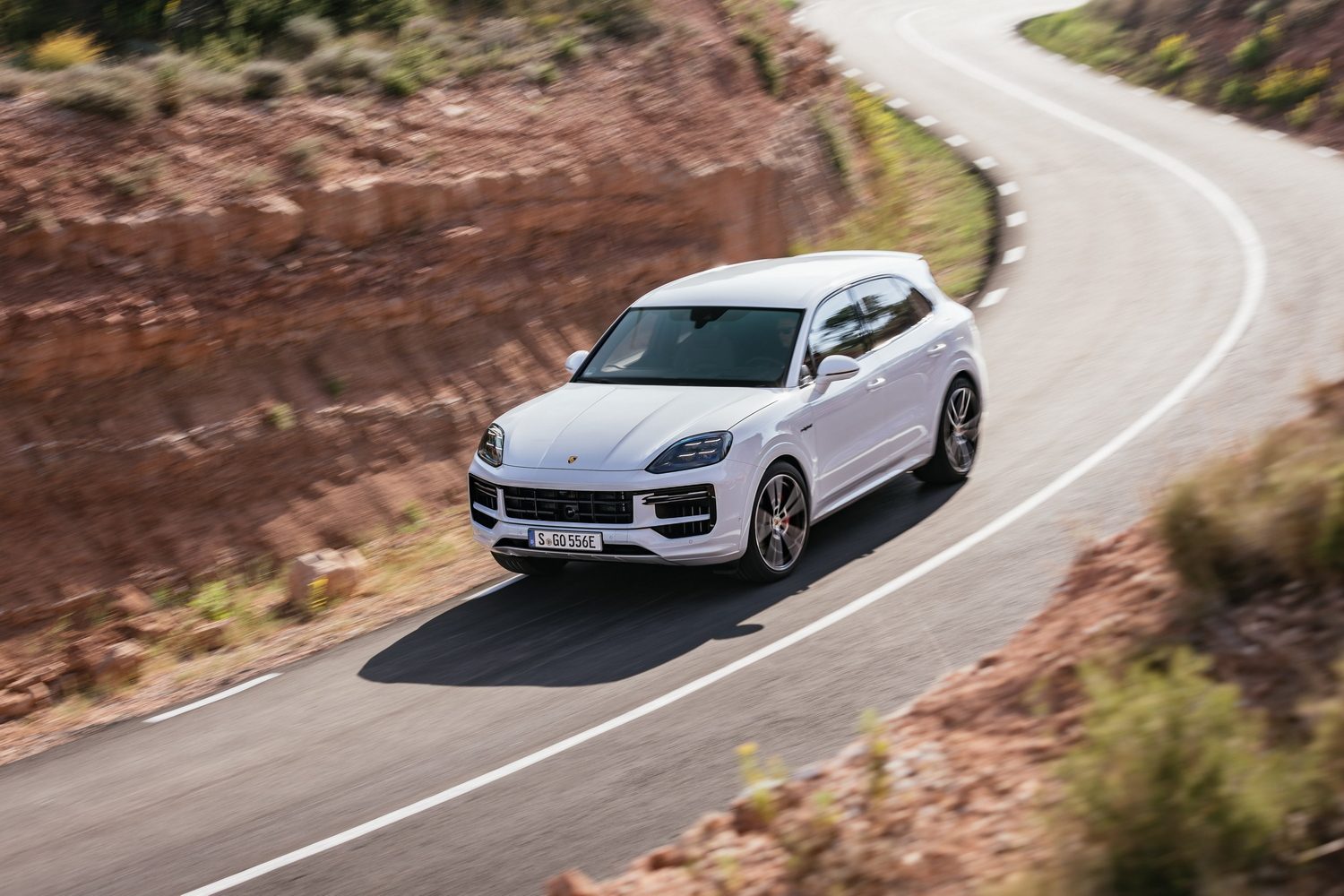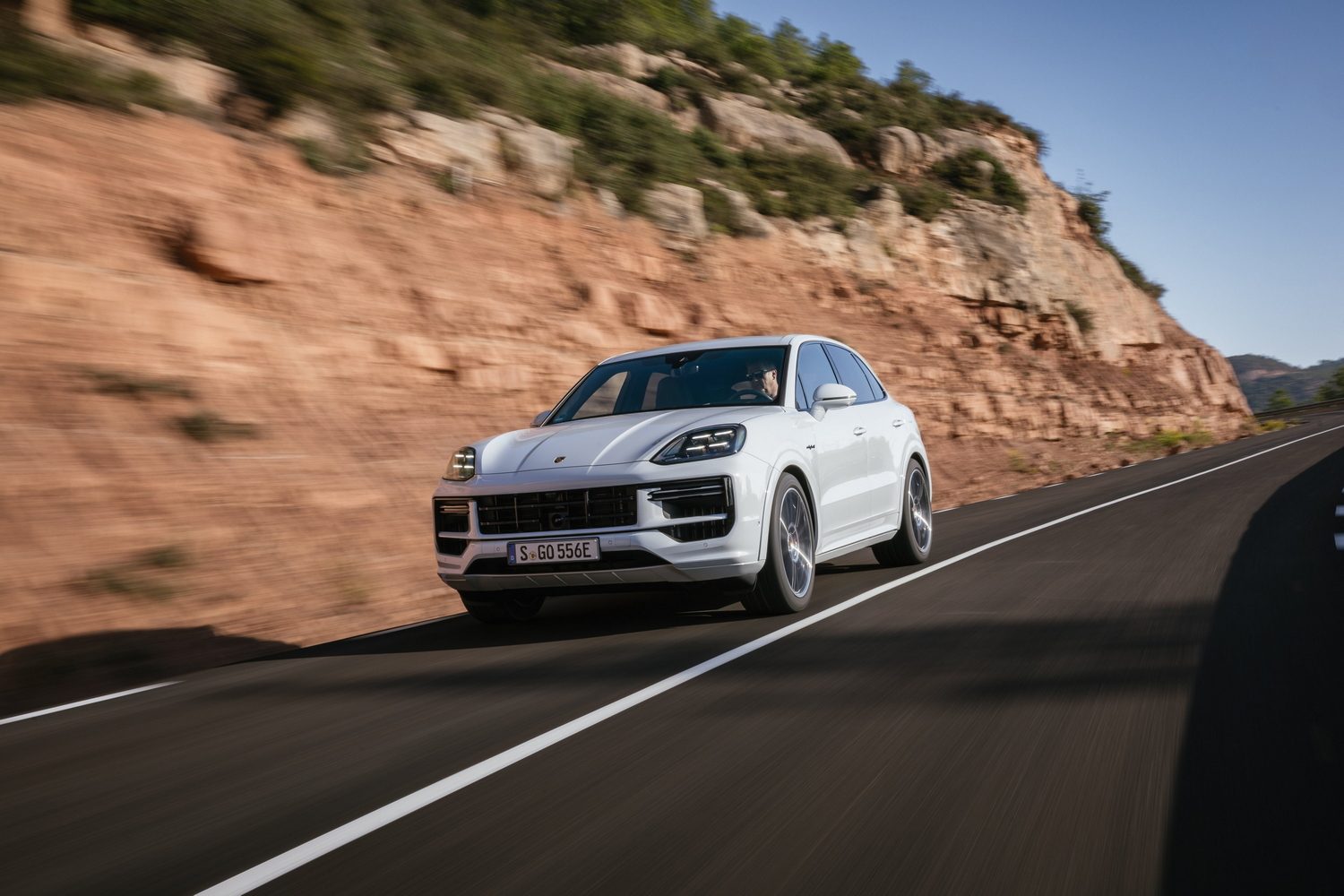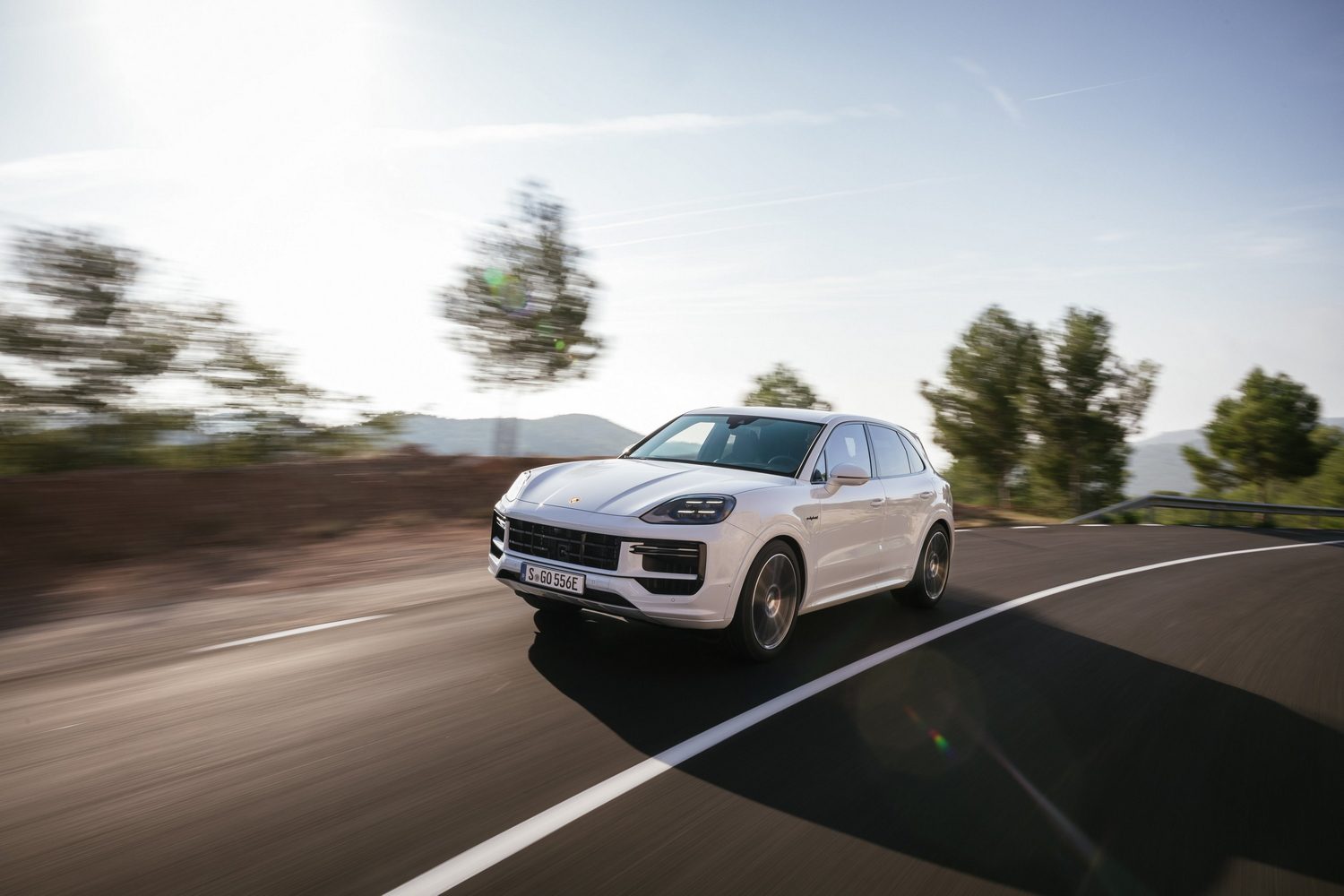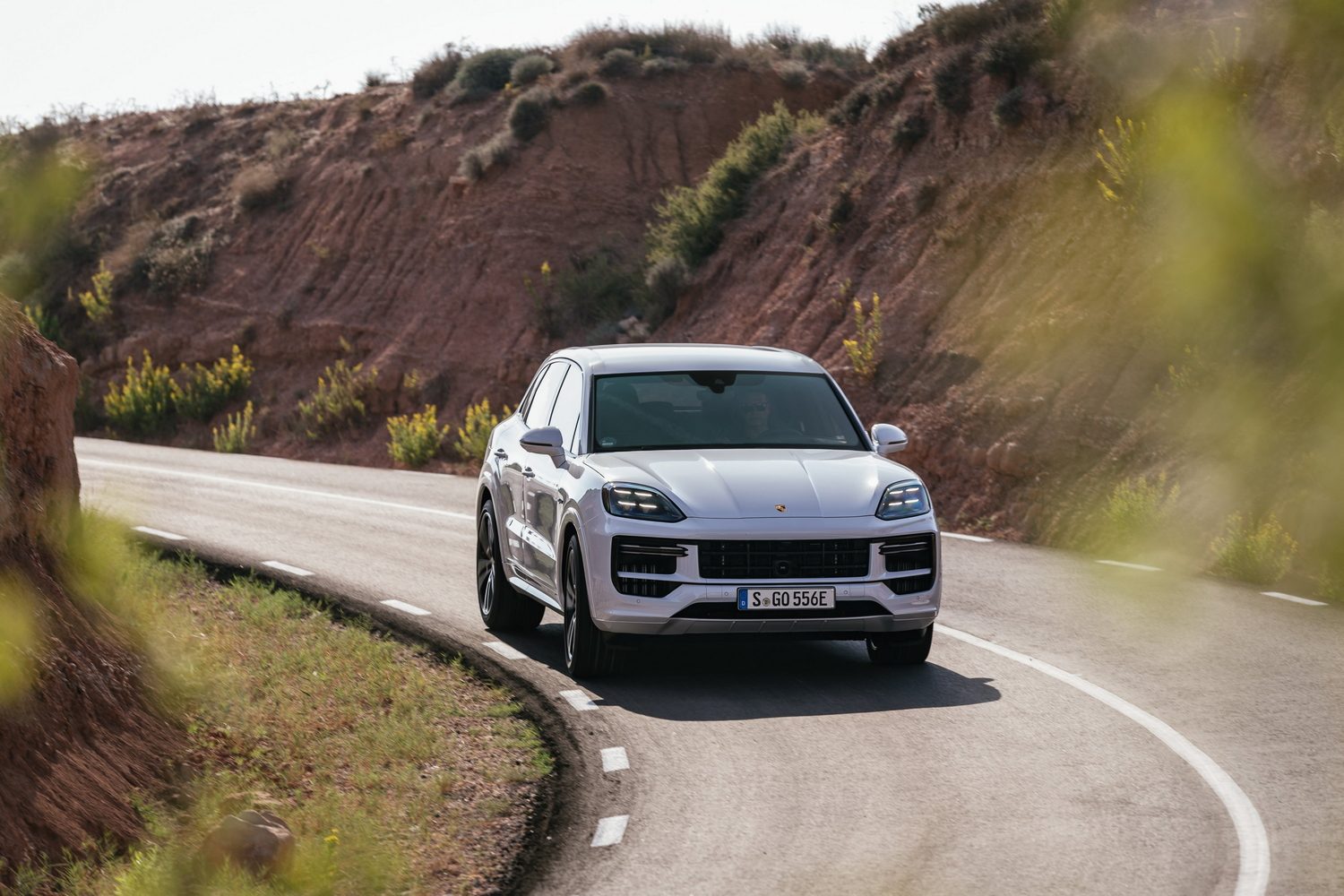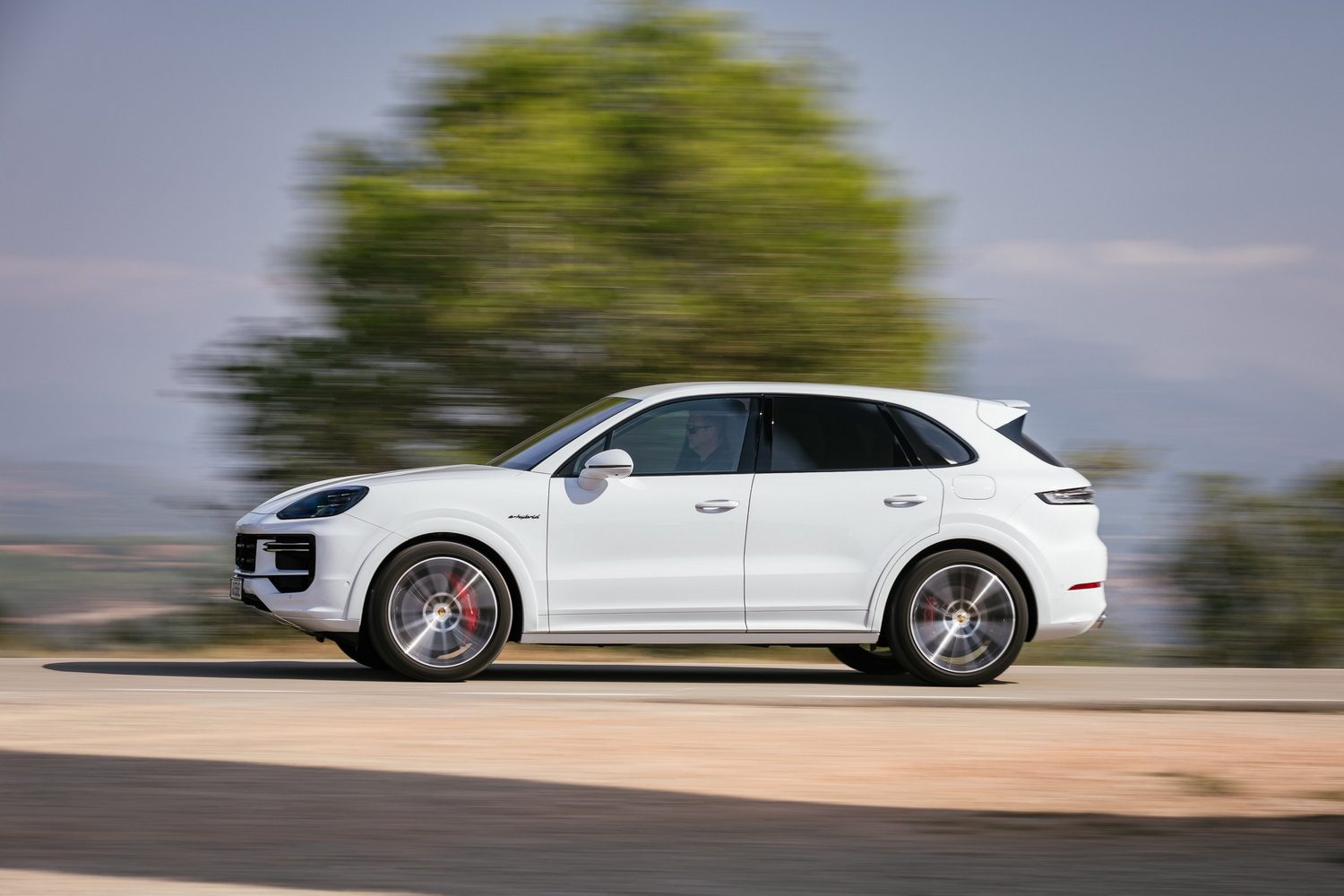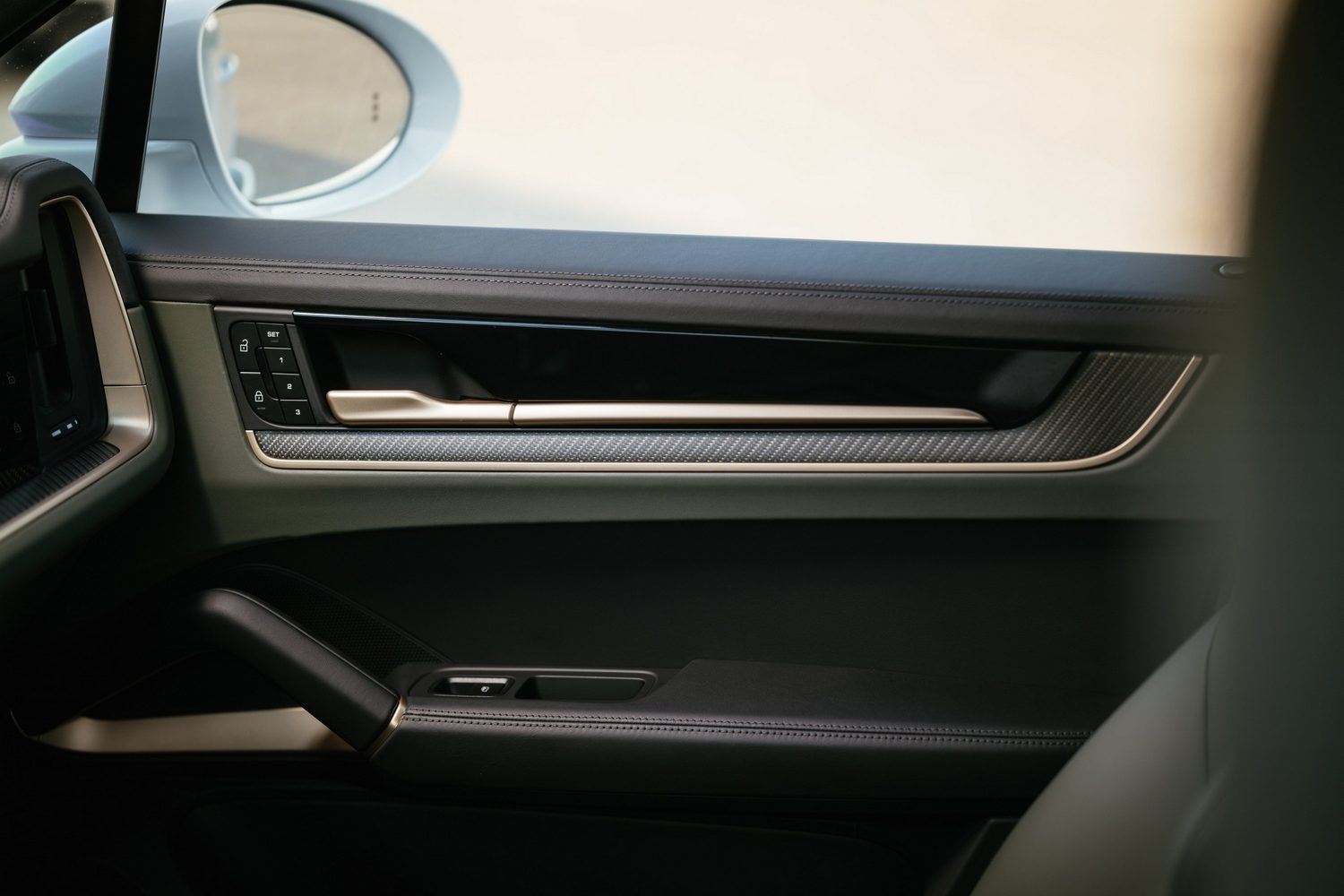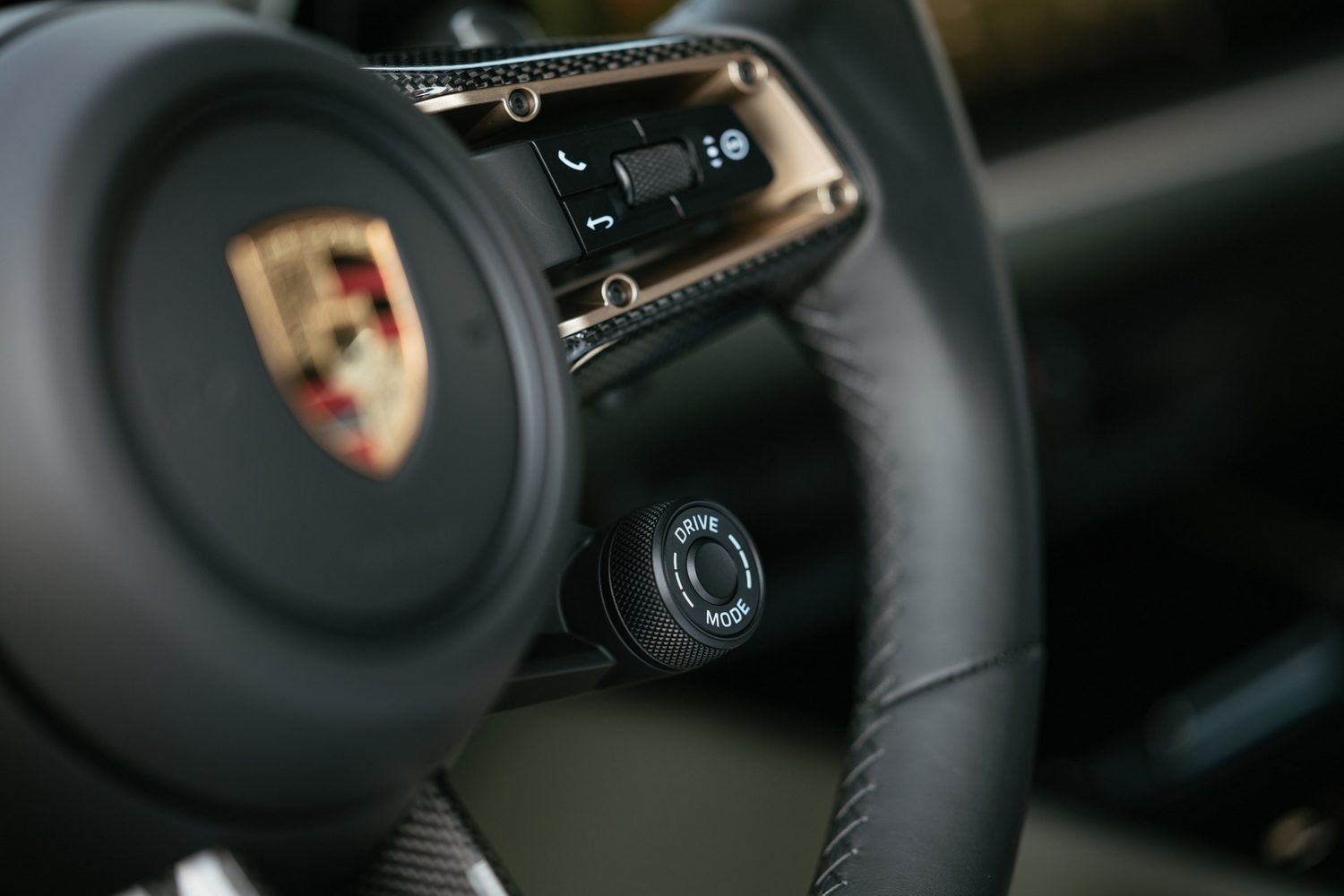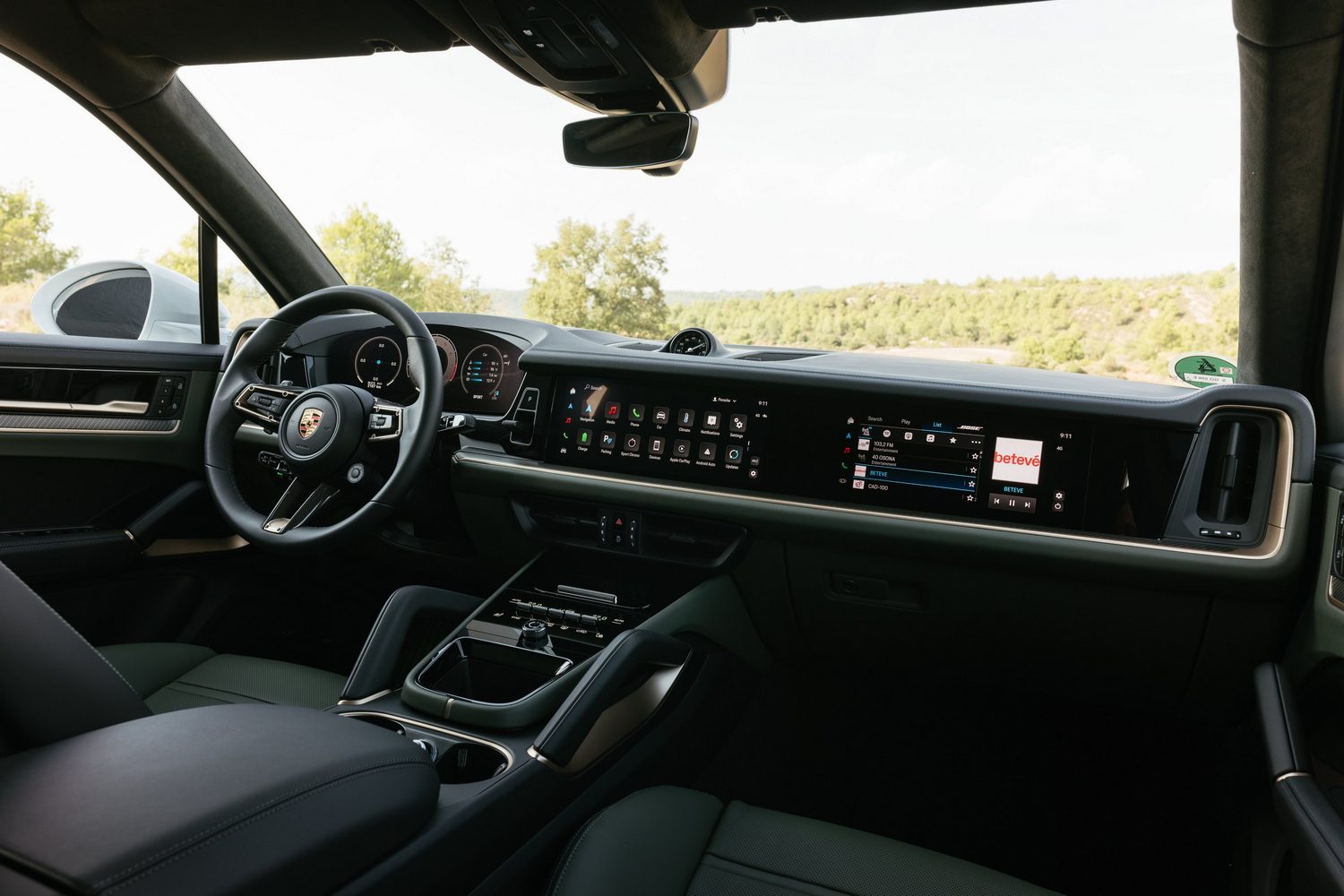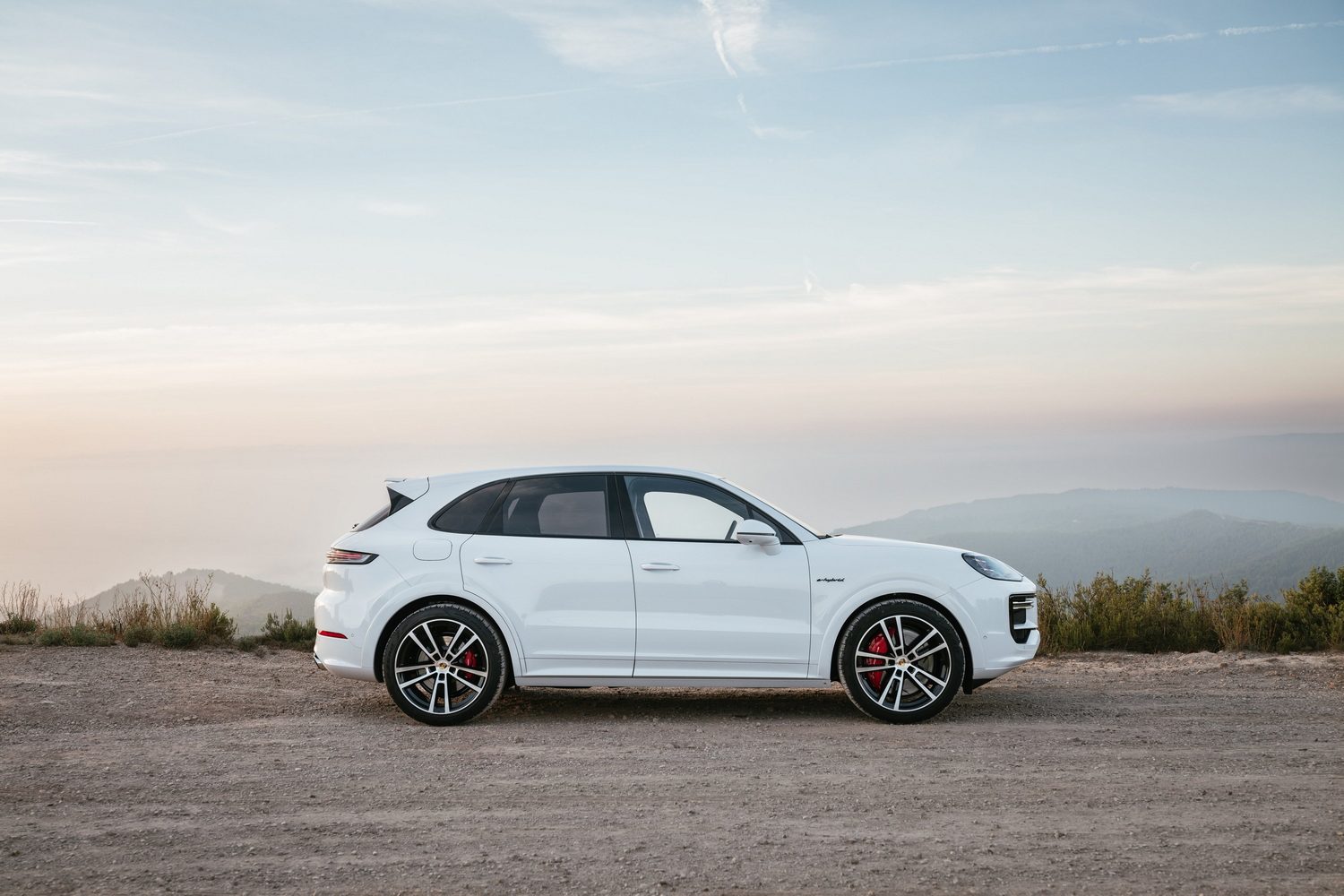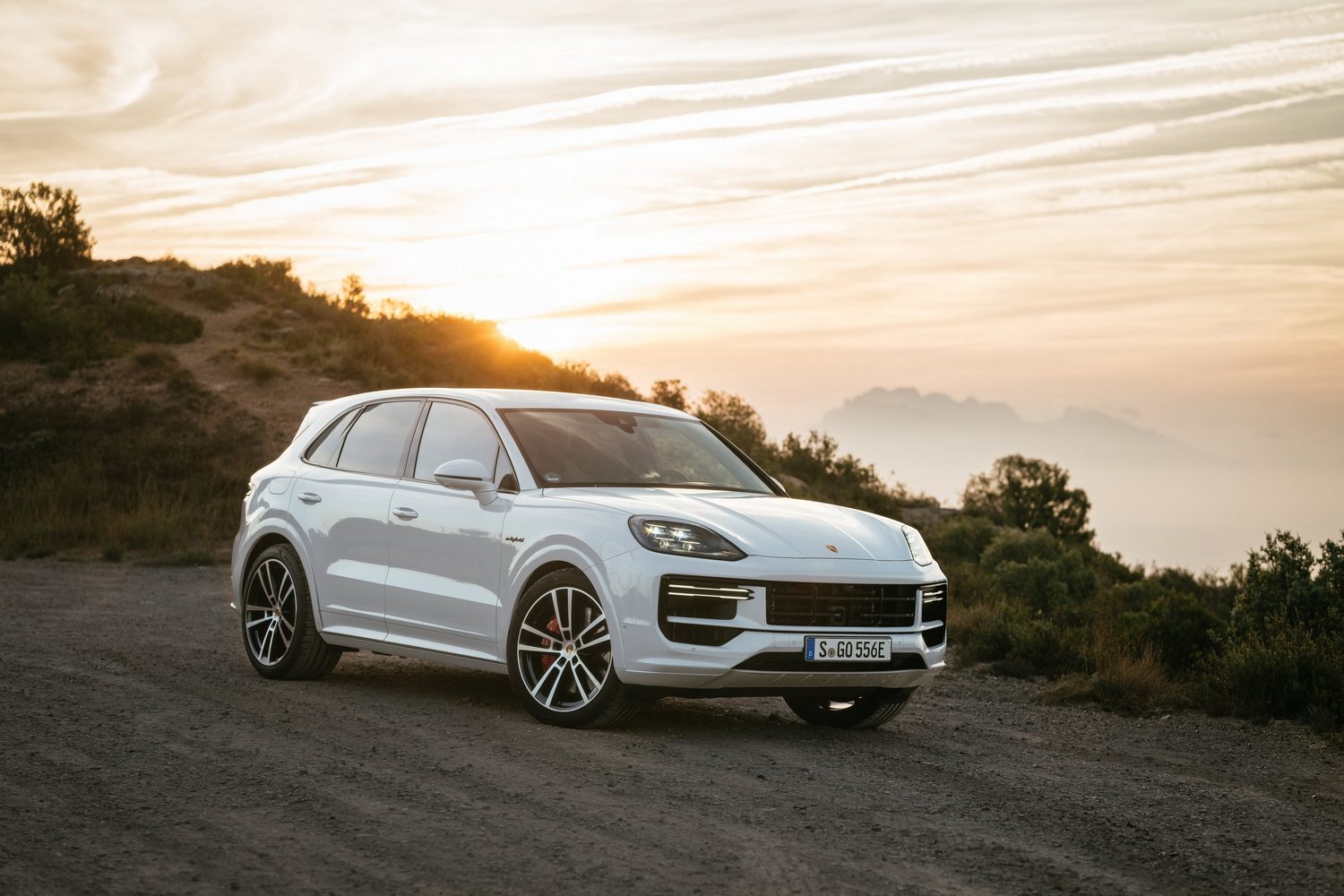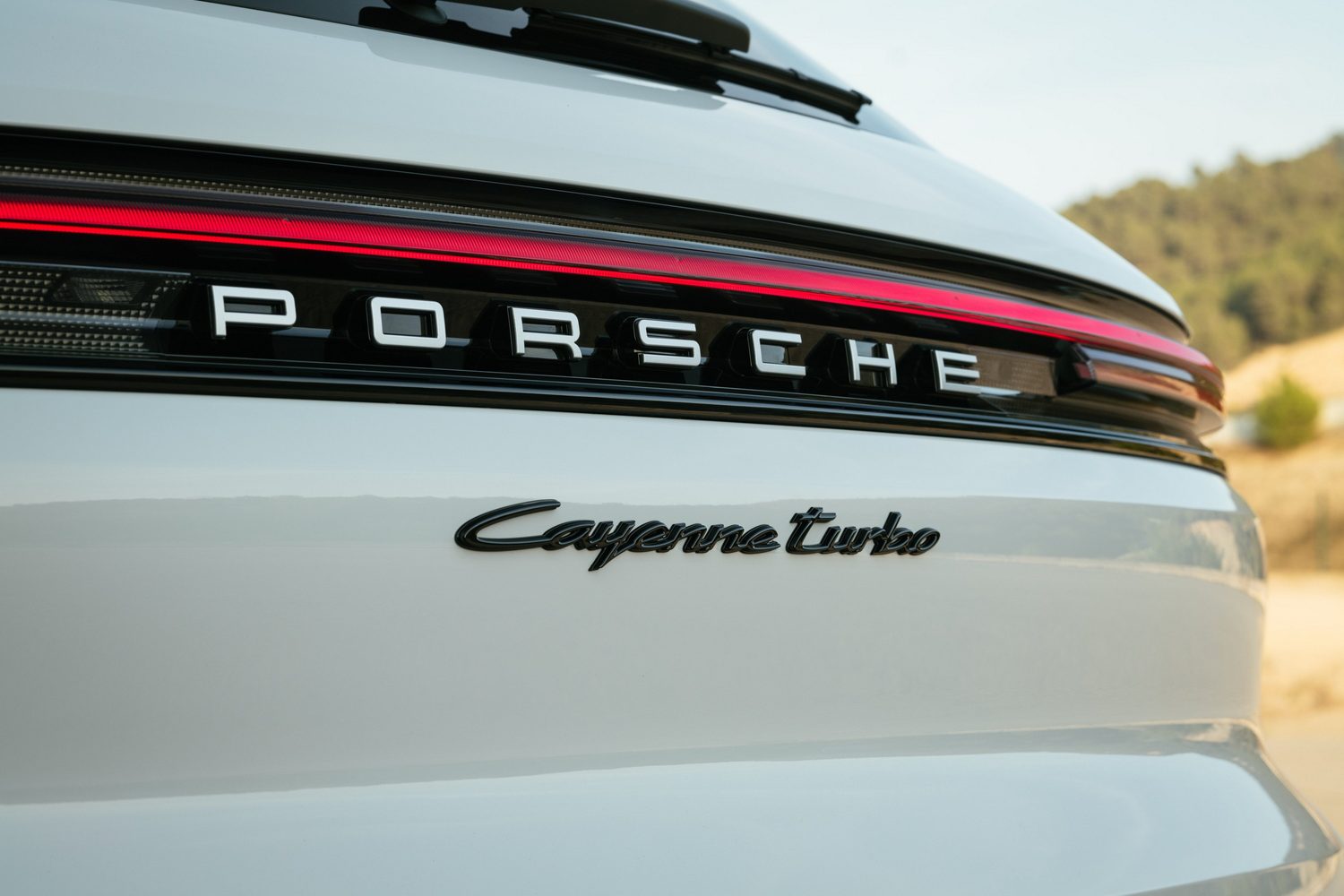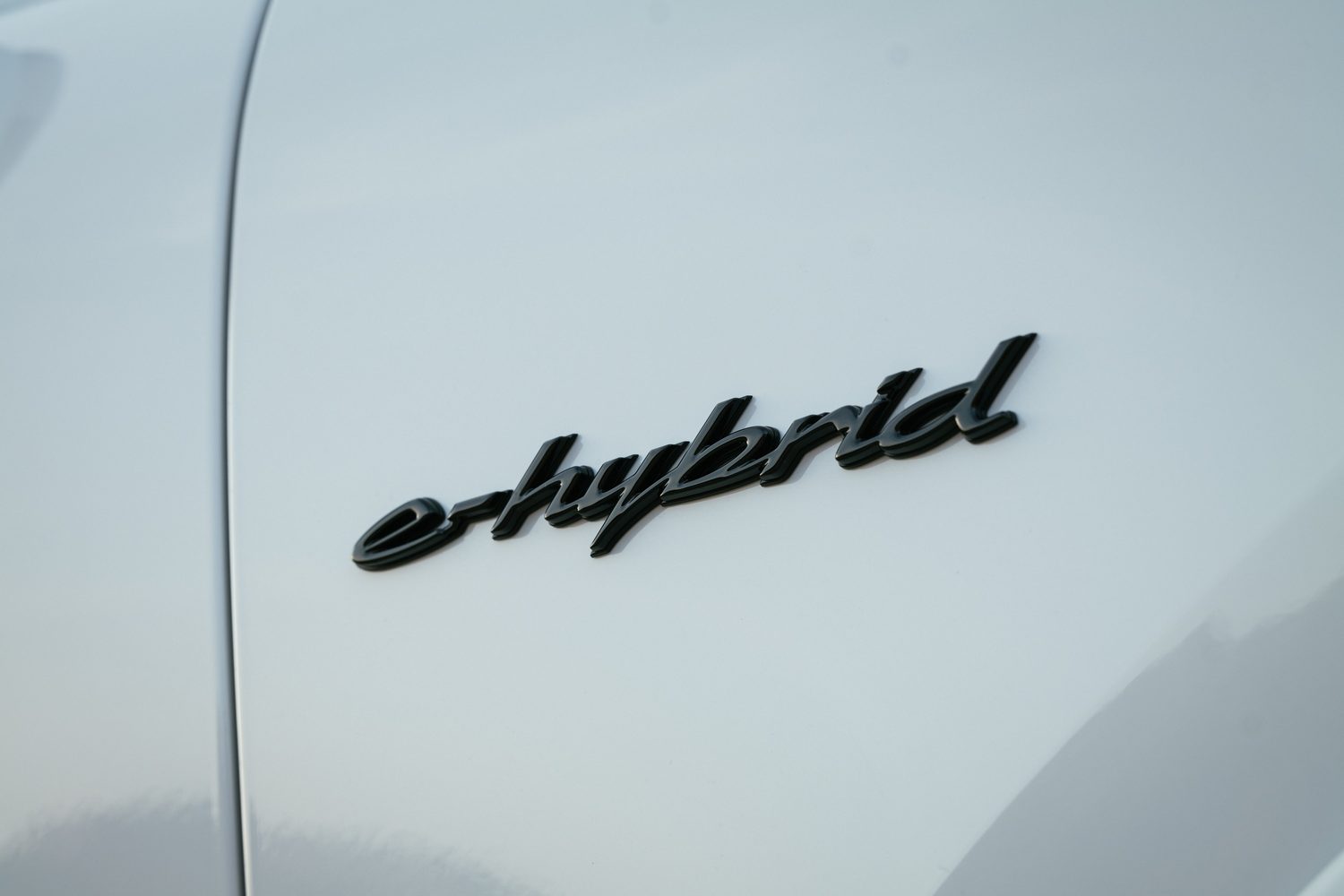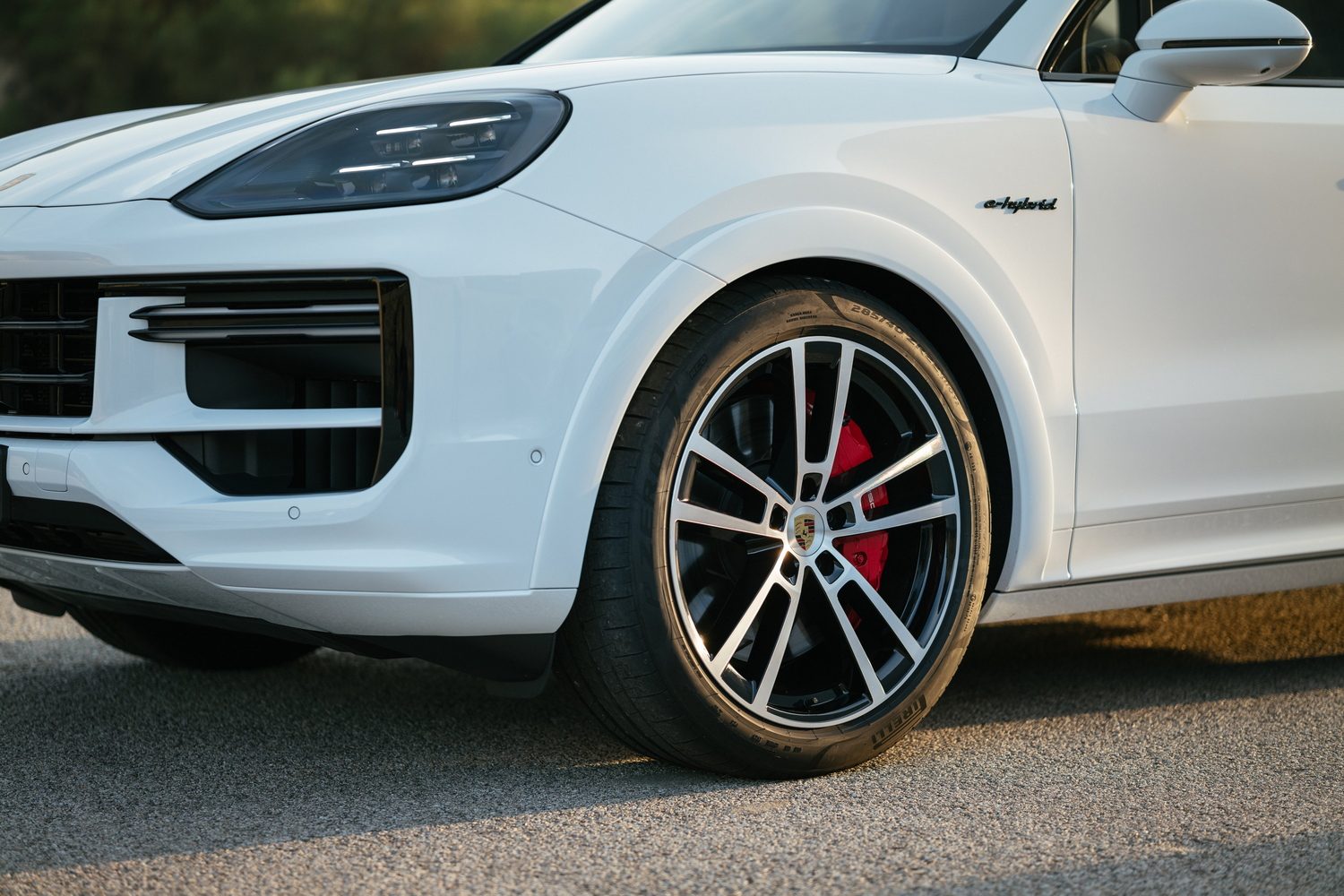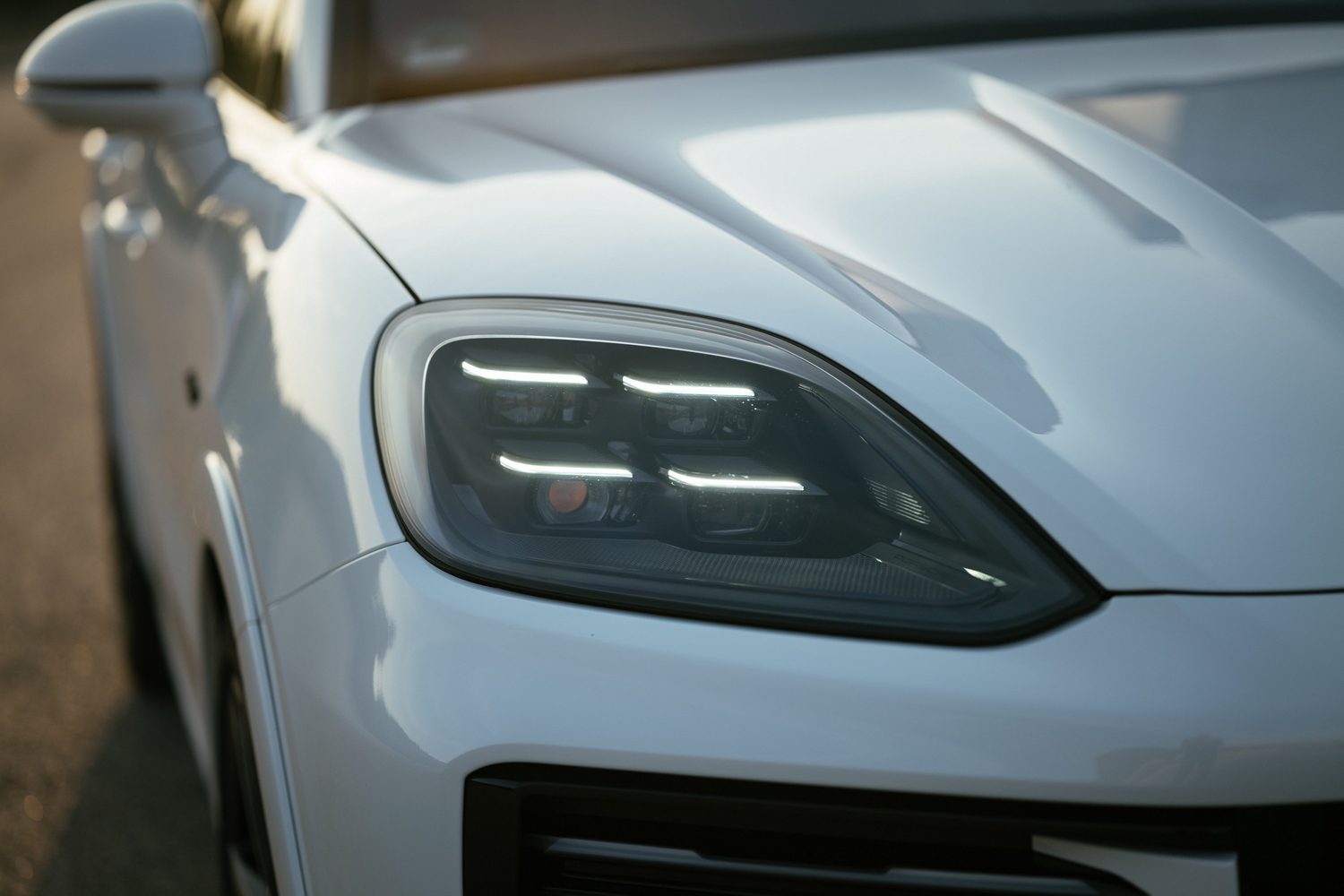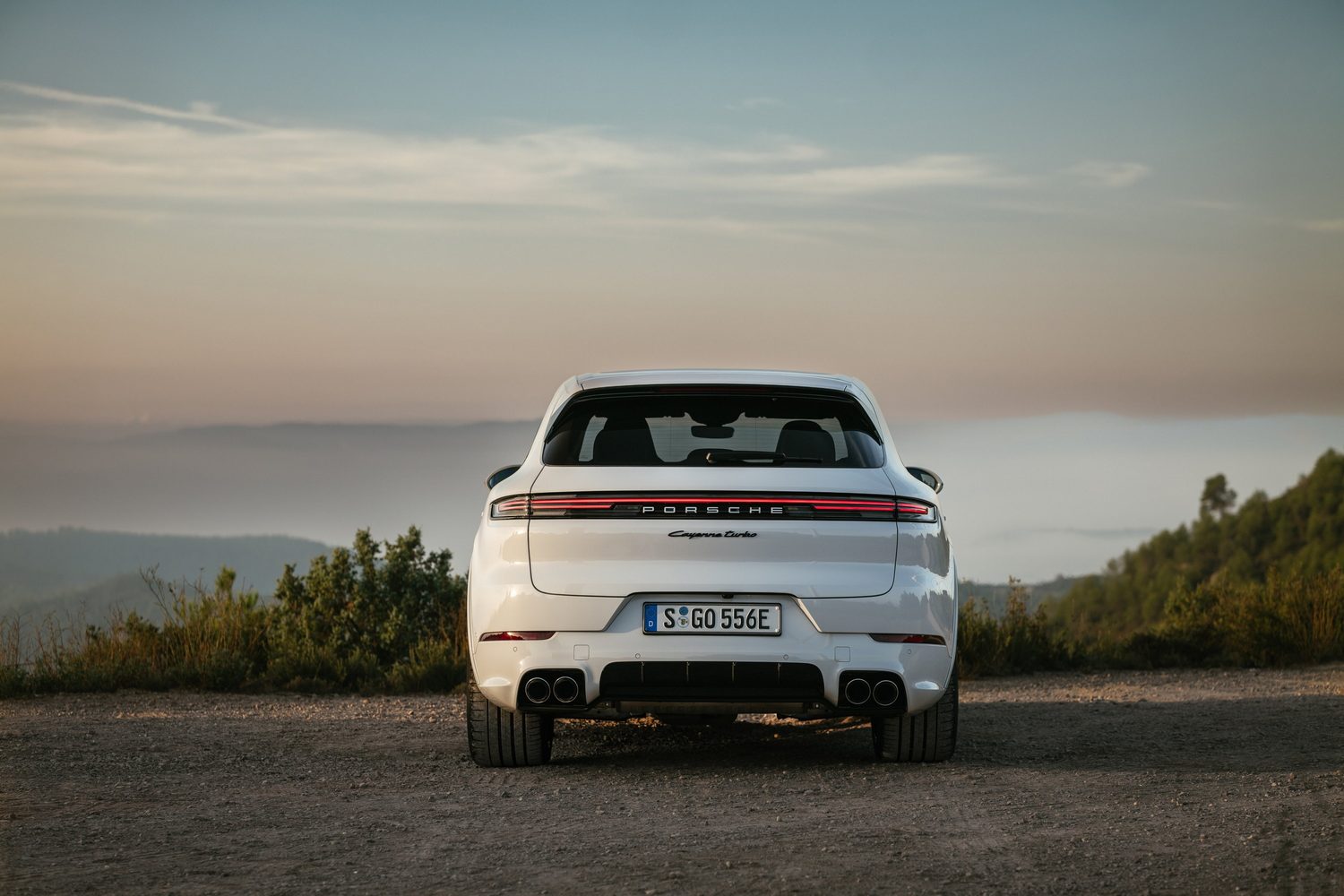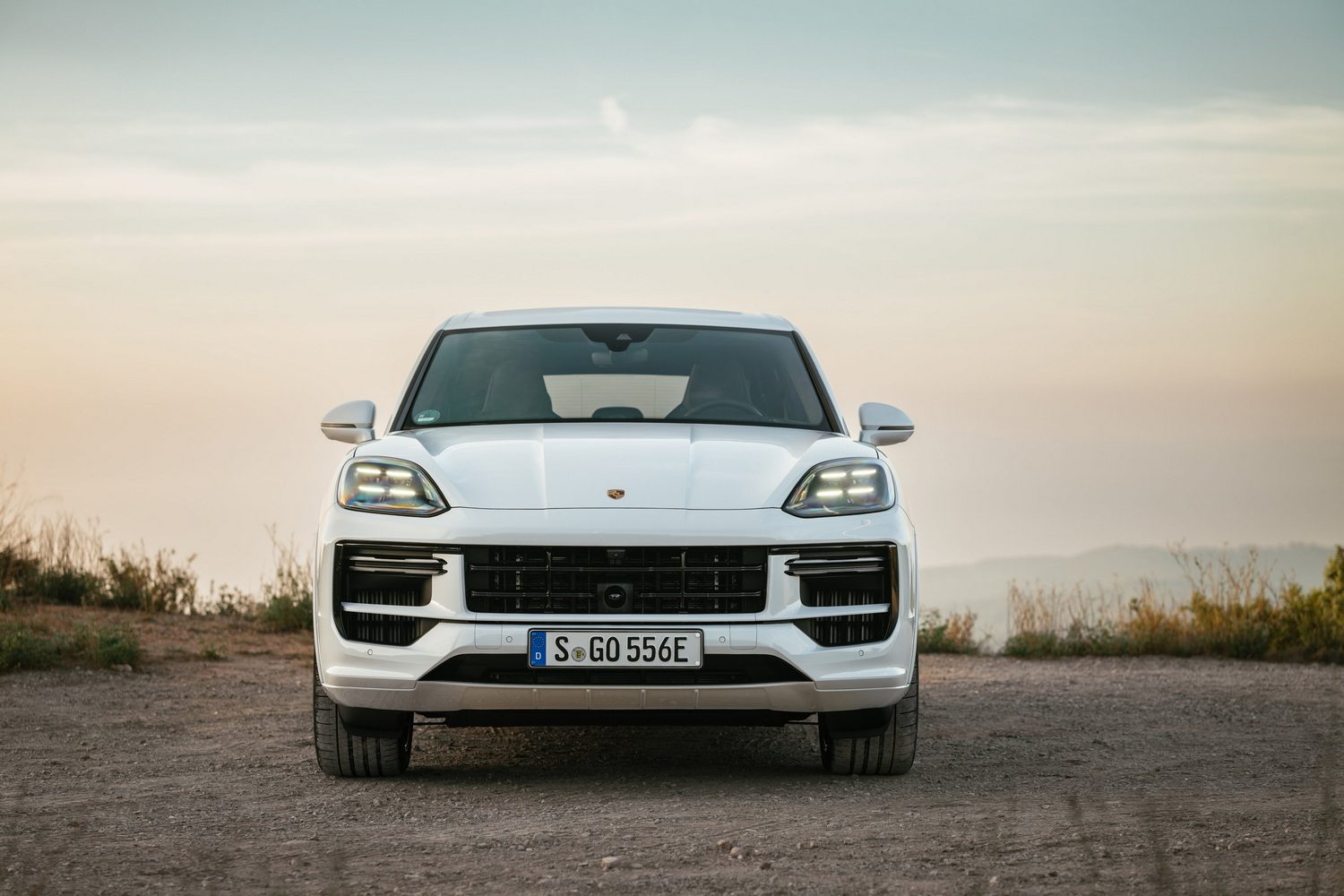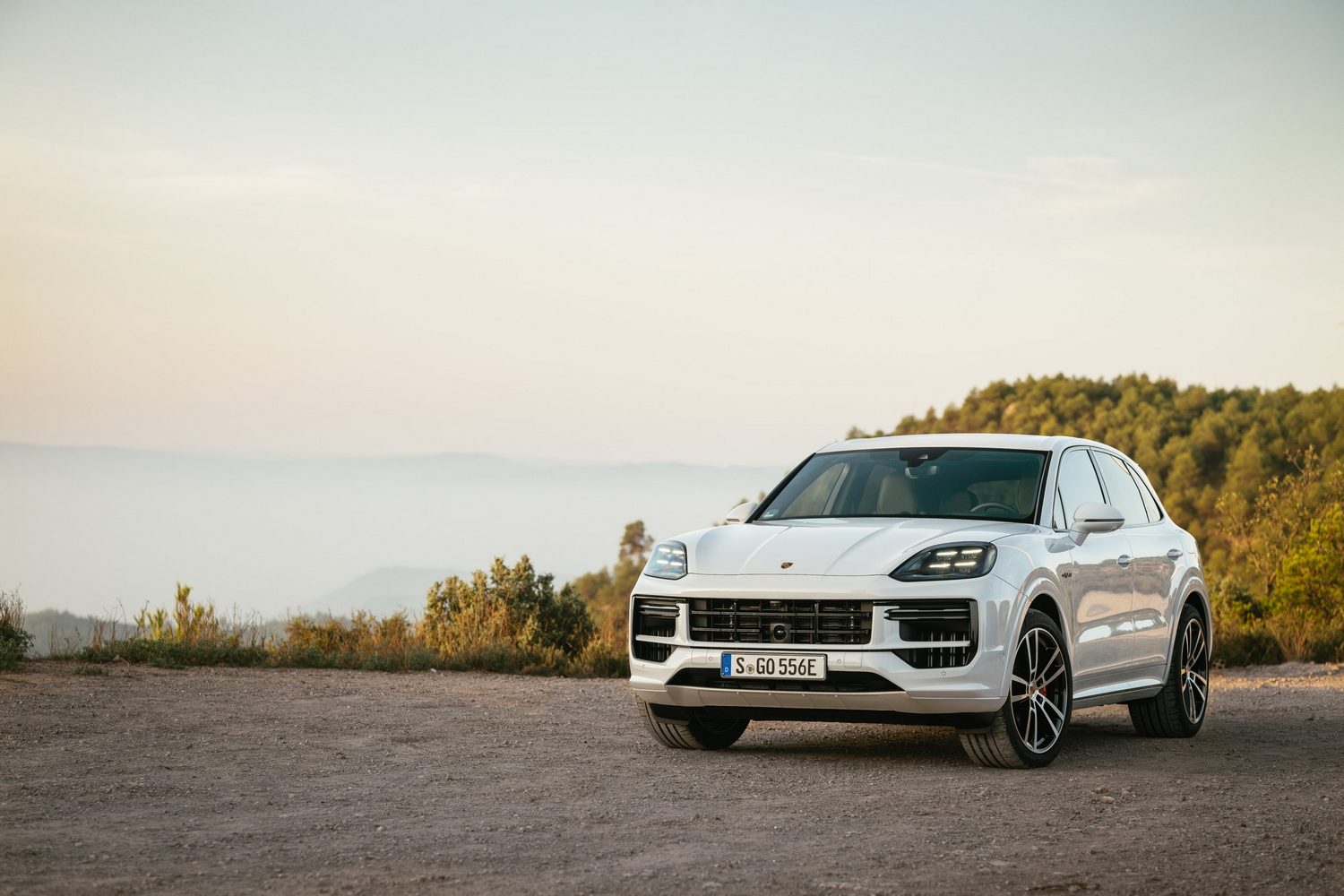Aside from the astonishing 918 Spyder - the very car which, ten years ago, set the Porsche plug-in hybrid electric vehicle (PHEV) template - the new Cayenne Turbo E-Hybrid is the most powerful road-going machine the German company has ever made that is fitted with an internal-combustion engine (ICE). But does that make it a worthy successor to the now-defunct Turbo models?
In the metal
With all third-generation Porsche Cayennes receiving a facelift, the overarching themes include a new bonnet and front wings, revised air intakes and headlights, and a general tidy-up of the rear - the big difference for the SUV, as opposed to the Coupe, being that its number plate has been relocated from the boot lid to the rear bumper.
This Turbo E-Hybrid model, though, which is available as an SUV and a Coupe, and the Turbo E-Hybrid with GT Package (which comes as a Coupe only), gain further distinguishing features, such as larger front air intakes with gloss-black 'airblades', even wider wings and of course 'Cayenne Turbo' boot badging. Stick with the regular Turbo E-Hybrid and there are quad exhausts at the back - the GT Package-equipped car gets dual oval pipes centred in its diffuser - while the usual 'E-Hybrid' logos and the twin filler flaps of the petrol/electric drivetrain denote this as one of the PHEVs.
Inside, there isn't anything specific that tells you that you're in the plug-in hybrid model, although as a Turbo you get more equipment and some sumptuous appointments to reflect its flagship status. Chief among these is a set of super-supportive, 18-way electrically adjustable sports seats up front, along with a heated GT Sport steering wheel, Race-Tex microfibre for the headlining, aluminium trim inlays in the dash and door cards, and the fitment of the Bose Surround Sound system as standard.
Like any facelifted Cayenne, the Turbo E-Hybrid now features the 12.6-inch digital instrument cluster - which has a central 'Turbo' logo to let you know you're in the ultimate Porsche PHEV - a gear lever up on the dashboard instead of the centre console and the option of a separate dash-mounted 10.9-inch touchscreen just to keep your front-seat passenger entertained on longer journeys. Boot space is down from the peak 772 litres quoted for some petrol versions of the Cayenne SUV to 545 litres here, mainly because of the positioning of the plug-in hybrid components, but in general the Porsche is a practical and high-quality thing when it comes to the interior.
Driving it
You might, if you were familiar with Porsche's particular method of badging up its cars, be tempted to think the new Turbo E-Hybrid had less power than the Turbo S E-Hybrid it replaced; you see, Porsche always adds an 'S' to the nameplates of cars where it tweaks the power from a base model - so, over the years, we've had 911 Carrera and 911 Carrera S, 718 Boxster and 718 Boxster S, Macan and Macan S, naming but a very small few. This has, of course, translated into the Cayenne family, where there have been base Cayenne and then hotter Cayenne S variants over the 21 years it has been on sale (where has the time gone?!), while Turbo and Turbo S is the sort of model hierarchy that gets Porsche-philes salivating.
So the loss of the S this time around could be some cause for concern... were it not for the fact this Cayenne PHEV is outrageously powerful, more so than the old 680hp/900Nm Turbo S E-Hybrid. Where that vehicle had a 550hp 4.0-litre biturbo V8 and a 136hp electric motor, Porsche has gone to town on both parts of the new Turbo E-Hybrid's drivetrain - so the V8 now delivers 599hp on its own, augmented by 176hp from the electric motor hidden in the Cayenne's eight-speed Tiptronic gearbox.
The peak outputs, while not quite the 775hp you've probably already totted up, are not far off that: the Cayenne Turbo E-Hybrid delivers up to 739hp from its PHEV system, backed up by a goliath 950Nm. Which means that, despite the fact it can weigh getting on for 2.7 tonnes depending on which specification of it you go for, this mighty SUV can run 0-100km/h in 3.7 seconds and go on to 295km/h - wherever that happens to be legal. I.e. only in Germany.
Also like other updated Cayennes, certainly the higher-powered PHEVs, the Turbo E-Hybrid gets new two-chamber air suspension with two-valve Porsche Active Suspension Management (PASM) dampers, replacing the old three-chamber and single-valve PASM set-up. Aimed to make the SUV both sharper in the corners, as well as more comfortable when it's being driven more sensibly, it's a difficult dynamic magic trick to pull off - but if anyone can do it, Porsche can. And, spoiler alert, it has succeeded. Obviously.
Whether you're near-silently gliding about town, admiring the extra ride comfort those fancy new dampers afford something so heavy that's sitting on 21-inch wheels, or you've taken the Cayenne by the scruff of the neck and awoken the V8 so you can charge through a few corners, you will rarely find the Turbo E-Hybrid wanting. Of all the new part-electric additions to the range, it's perhaps the one which exhibits the most body lean, pitch and dive, to the point that it can just occasionally - and we do mean occasionally - feel like it has got a tiny bit away from your control, but overall it is nevertheless astoundingly accomplished for a big, weighty, technologically advanced vehicle like this.
Highlights include genuinely great steering, brakes which don't feel too mushy underfoot once you've got through the regenerative part of the pedal's travel, an abundance of traction from the Porsche Traction Management (PTM) all-wheel-drive set-up and that truly stonking V8 engine. The reason this model has 'lost its S', if you'll forgive the clunky phrase, is that European emissions regulations mean you will not be able to get a non-electrified Cayenne Turbo going forwards - it'll continue in the US, where they're a bit more... lax about tailpipe nasties, but over here? It's the PHEV or nothing if you want a capital-T Turbo. So there's no longer any need to demarcate this particular SUV loon from a 'lesser' model in the range, you see.
You won't miss that single alphabetic denominator, though. Not when you've experienced 739hp and 950Nm of petrol-electric shove in action. Cripes, the Cayenne Turbo E-Hybrid is dementedly fast. Having driven it on track, it really tells in the zone beyond 160km/h, which is usually where the fairly rapid and the truly rabid are separated. The way the Turbo E-Hybrid punches through said speed with disdain and then hauls itself to 200km/h-plus in the blink of an eye makes you acutely aware that if you left your foot in it on the roads, it would just keep on hauling to the sort of speeds that would make international headlines if you weren't careful. So don't do that. And all the time, this performance is overlaid with that rich, thunderous V8 bellow that the Porsche 4.0-litre unit has become so beloved for.
It's really in those upper reaches, though - which, of course, are going to be illegal nearly everywhere in the world that isn't a racetrack - where the difference between the Turbo E-Hybrid and the launched-at-the-same-time S E-Hybrid is most keenly felt. When it comes to lower-level urgency and response, the V6-powered Cayenne PHEV doesn't come across as appreciably weaker, which makes the honking great €54,200 price gap between the two look all the more acute. Especially when, as we found, if you drive the Cayenne Turbo E-Hybrid up the side of a mountain on a fun road with a bit of vigour and little charge left in its battery pack, you'll be looking down the barrel of 36.8 litres/100km. No joke.
That's not representative of how most owners will use them, naturally, but it does enhance the suspicion you have that a 599hp V8 lugging 2.7 tonnes of SUV without any electrical assistance to back it up might turn out to be a bit... well, thirsty. Will that matter to those that want the cachet of the Turbo badging, and a 739hp output? Probably not, but if we're offering you sound consumer advice, our gut feeling is that for all its undoubted technical supremacy, the Turbo E-Hybrid might not make anything like as much sense on a day-to-day basis as the S E-Hybrid does further down the range.
What you get for your money
The Cayenne SUV begins at €101,599 in Ireland for the 470hp E-Hybrid, with the pure-petrol models starting from a more substantial €136,359 due to CO2 emissions and their effect on VRT. So if you compare the €165,151, 739hp Turbo E-Hybrid to the €163,410, 474hp Cayenne S that uses the same 4.0-litre V8, you might even start rolling the word 'bargain' around in your head for the former. That is, until you see that the S E-Hybrid is €110,951, giving you that huge purchase-price saving we mentioned earlier.
Due to its additional weight, the Turbo E-Hybrid also can't tow quite as much as the S E-Hybrid, maxing out with 3,000kg of braked trailer. The weight also has an effect on electric range, as the Turbo will manage between 70-73km on electric power alone; slightly less than the S E-Hybrid's 71-78km figure. You'll also see more like 2.0 litres/100km from the Turbo E-Hybrid, officially, although charging times for the new, enlarged 25.9kWh battery pack are just as quick with this model as they are with any other E-Hybrid. At its 11kW maximum AC rate, around two-and-a-half hours should see the battery go from flat to fully charger, while a 7.4kW domestic charger will take more than three hours.
Summary
Blisteringly powerful and incredibly capable in the handling stakes, the Cayenne Turbo E-Hybrid is a prime example of the depths of genius of Porsche's engineering department. To make something as heavy, complex and tall as this work like a pseudo-sports car is nothing short of remarkable. That said, though, for all the magnificent V8 noises it makes and the phenomenal speed it can summon up when you want it to, the Turbo E-Hybrid feels a little bit like the overlooked middle child among the new PHEV models in the facelifted Cayenne range - it is neither as dynamically thrilling as the hardcore Turbo E-Hybrid with GT Package, nor is it quite as relaxing or cheap-to-run as the V6-based S E-Hybrid. Still, when you've got nigh-on 750hp to play with in your family SUV, will such considerations bother you?

